Turkey summons Iranian envoy over policy criticism
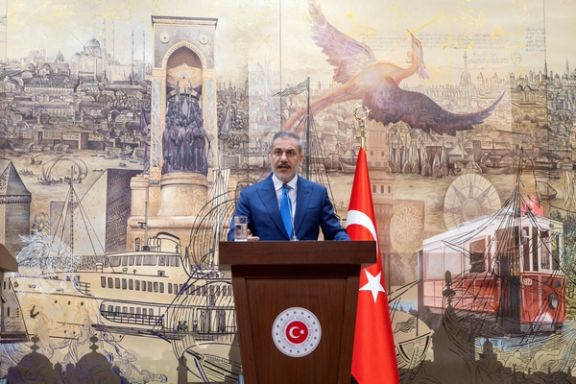
Turkey summoned Iran's chargé d'affaires on Tuesday over Tehran's public criticism of Turkish policies.

Turkey summoned Iran's chargé d'affaires on Tuesday over Tehran's public criticism of Turkish policies.
Turkey's move followed a meeting at Iran's Foreign Ministry, where Turkey's ambassador met with Mahmoud Heydari, the ministry's Director General for the Mediterranean and Eastern Europe, on Monday.
The meeting was prompted by Turkish Foreign Minister Hakan Fidan's recent remarks regarding Iran's role in Syria.
"The mutual interests of our nations and the delicate regional situation necessitate the avoidance of inaccurate statements and unfounded analyses that could strain bilateral relations," Heydari stated.
Fidan, in an interview with Al Jazeera, had described Iran's reliance on militias as dangerous and called for a policy shift.
He also suggested that "if you are attempting to destabilize a third country, other nations may reciprocate by supporting groups within your own borders."
Earlier on Monday, an Iranian Foreign Ministry spokesperson acknowledged disagreements between Tehran and Ankara.
"We place great value on our bilateral relationship with Turkey," Esmaeil Baghaei said. "However, the recurring remarks we have heard were counterproductive, requiring Iran to articulate its position firmly and clearly."
Baghaei further added, "Perhaps our Turkish counterparts should give greater consideration to the policies of the Zionist regime (Israel) in Syria and the wider region."
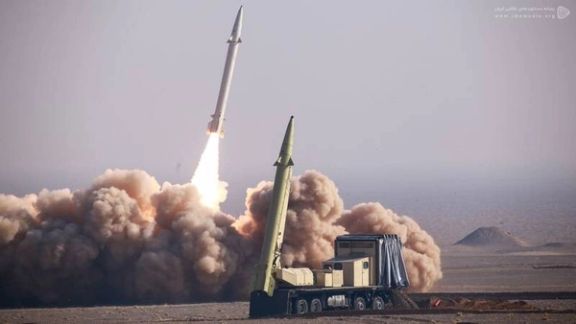
Israel's Defense Minister Israel Katz said Iran remains its greatest threat following talks with US Secretary of Defense Pete Hegseth.
"The Minister of Defense and the Secretary of Defense agreed that Iran is the main threat to the region, and that close cooperation between Israel and the United States should continue with the aim of preventing it from obtaining nuclear weapons," a statement from Katz's office said.
Katz thanked Hassett for the support of President Donald Trump and the administration to accelerate the delivery of weapons and security equipment to Israel.
On Saturday, US Secretary of State Marco Rubio released a statement to say that he has signed a declaration to use emergency authorities to expedite the delivery of approximately $4 billion in military assistance to Israel.
"The decision to reverse the Biden Administration’s partial arms embargo, which wrongly withheld a number of weapons and ammunition from Israel, is yet another sign that Israel has no greater ally in the White House than President Trump," he said.
Since taking office, the Trump Administration has approved nearly $12 billion in major foreign military sales to Israel.
"This important decision coincides with President Trump’s repeal of a Biden-era memorandum which had imposed baseless and politicized conditions on military assistance to Israel at a time when our close ally was fighting a war of survival on multiple fronts against Iran and terror proxies," he said.
Last year, Iran launched two aerial strikes on Israel amid attacks from its military allies around the region as the two enemies' shadow war came to the fore, with Israel retaliating with strikes deep into Iran.
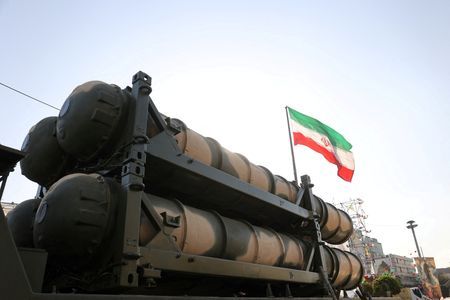
Several senior Russian missile specialists traveled to Iran over the past year as Tehran and Moscow expanded their defense cooperation, Reuters reported on Tuesday, citing a review of travel records and employment data.
Seven weapons experts flew from Moscow to Tehran on April 24 and September 17 last year, according to the report.
Their trips occurred amid heightened tensions between Iran and Israel, as both countries exchanged military strikes in the same months.
The report, citing a senior Iranian defense ministry official, said Russian missile experts had visited multiple Iranian missile production facilities last year, including two underground sites. Some of these visits took place in September, the official said, without specifying locations.
A Western defense official cited by Reuters said that Russian missile specialists visited an Iranian missile base west of the port of Amirabad on Iran’s Caspian Sea coast in September.
According to Reuters, all seven Russian experts have military backgrounds.
The report said that a review of Russian databases showed that two hold the rank of colonel, two are lieutenant-colonel, and others specialize in air-defense missile systems, artillery, rocketry, advanced weapons development, and missile testing.
Their employment records range from 2021 to 2024, but it is unclear whether they still hold these positions, Reuters said.
The report said Hooshyaran-e Vatan, a group of activist hackers opposed to the Iranian government, provided the flight booking information to Reuters. The hackers claimed the seven Russians traveled with VIP status.
Reuters said it corroborated this information with a Russian passenger manifest from September, obtained from a source with access to Russian state databases. However, Reuters said it was unable to verify the manifest for the April flight.
Reuters identified two of the Russians booked on the April flight as Denis Kalko, 48, and Vadim Malov, 46. Tax records showed that Kalko previously worked at the defense ministry’s Academy for Military Anti-Aircraft Defense, while Malov worked for a military unit that trains anti-aircraft missile forces, according to 2024 records.
It also identified three other Russians on the April flight: Andrei Gusev, 45, a lieutenant-colonel who works as deputy head of the faculty of General Purpose Rockets and Artillery Munitions at the defense ministry’s Penza Artillery Engineering Institute; Alexander Antonov, 43, who has worked at the Main Rocket and Artillery Directorate; and Marat Khusainov, 54, a colonel linked to the Kapustin Yar missile-testing range.
According to Reuters, Sergei Yurchenko, 46, was one of two passengers on the September flight. Mobile phone records showed he worked at the Rocket and Artillery Directorate. His passport number had the prefix “22,” which is not used for private citizens or diplomats, Reuters said, citing Russian government regulations.
Reuters identified the other passenger as Oleg Fedosov, 46, who, according to Russian records, is linked to the Directorate of Advanced Inter-Service Research and Special Projects, a defense ministry branch developing future weapons systems.
Fedosov had previously flown from Tehran to Moscow in October 2023, using his official state passport, Russian border crossing records showed.
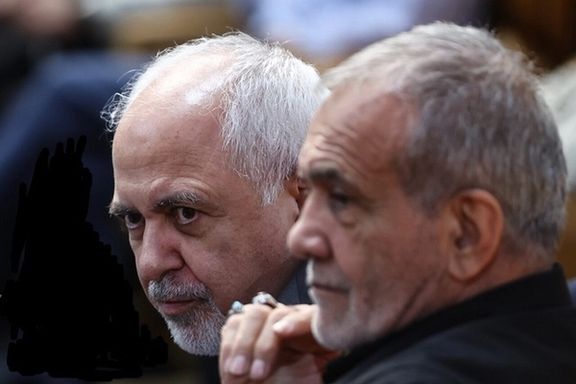
Mohammad Javad Zarif, the architect of Tehran's 2015 nuclear deal with world powers, resigned as Iran's vice-president, state media reported Sunday, a few days after the country's Supreme Leader voiced his opposition to holding talks with Washington.
"President Masoud Pezeshkian has received Javad Zarif's resignation letter but has not yet responded," the Iranian government's official news agency IRNA confirmed.
Zarif's resignation came after the Parliament ousted the Pezeshkian administration’s finance minister in a vote of no confidence, the IRGC-affiliated Fars News reported, citing two unnamed sources.
However, the semi-official ISNA news agency reported that the resignation was unrelated to the Parliament's impeachment of the finance minister and was submitted before the vote of no confidence.
"In his letter to the president, Zarif said that he prefers to serve Iran by teaching at a university," ISNA added.
Many observers believed that Zarif joined the Pezeshkian administration to help negotiate another nuclear deal with world powers similar to the Joint Comprehensive Plan of Action (JCPOA), which was scrapped by Donald Trump during his first term in office.
However, Supreme Leader Ali Khamenei, the country's ultimate decision-maker, rejected the idea of talks with Trump last month, calling them "neither wise, nor intelligent, nor honorable."
The Iranian president told parliament on Sunday that he initially supported negotiations with the United States but deferred to Khamenei’s position against engaging in talks.
“I believed it was better to engage in dialogue, but when the Leader said we would not negotiate with the US, I said, ‘We will not negotiate with the US, period,’” Masoud Pezeshkian said.
He added that government policy must align with Supreme Leader Ali Khamenei’s stance on the issue.
Zarif is no stranger to resignations, treating them almost like brief intermissions—having submitted five during his tenure under former President Hassan Rouhani.
Last August, he resigned as Pezeshkian's aide, but his departure was short-lived, as he returned as vice president for strategic affairs within a couple of weeks.
In November, Parliament Speaker Mohammad-Bagher Ghalibaf joined hardliners in the parliament who had long been calling for Zarif's dismissal over his son's US citizenship.
Ghalibaf called on Zarif to resign voluntarily as he, too, believed that Zarif’s appointment to the post was illegal.
Led by the Paydari (Steadfastness) Party faction, ultra-hardliners in Parliament have refused to amend a 2020 law that prohibits appointing dual nationals or individuals whose spouses or children hold dual nationality to "sensitive positions" in the government. Hardliners argue the restriction applies to Zarif.

Israel's prime minister praised the US President for providing the weapons the Jewish state needs to fight against Iran and its armed allies in the region.
On Saturday, the Trump administration approved a nearly $3 billion arms deal for Israel, bypassing the usual congressional review. The deal includes additional 2,000-pound bombs for use in its conflict with Iran-backed militants in the Middle East.
Prime Minister Benjamin Netanyahu on Sunday praised Trump's role in ensuring the supply of what he called critical military equipment, saying, "He has shown it by sending us all the munitions that were being held up."
"This way he is giving Israel the tools we need to finish the job against Iran’s terror axis," Netanyahu said, according to Israeli media reports.
He did not make clear whether he has received any green light from the White House for taking any action against Iran and its armed allies using the weapons provided by the Trump administration.
Since mid-2024, Israel has inflicted heavy blows against Iran's proxies in the region, especially weakening the Lebanese Hezbollah by eliminating hundreds of its fighters and most of its leadership.
Israel has also been considering attacks on Iran's nuclear sites and views its adversary as vulnerable, the Wall Street Journal reported last month citing US intelligence agencies' assessment in the waning days of the Joe Biden administration.
Israel is considering significant strikes on Iran in 2025 and views President Donald Trump as more amenable to their plans, the paper cited officials familiar with the assessment as saying.
US intelligence cited the risk of further conflict in the Middle East and characterized Iran as weakened following an Oct. 26 Israeli attack on Iran, adding that Israel views the window for denying Iran a nuclear weapons capability as fast closing.
Iran denies seeking a nuclear weapon but Israel says its Mideast nemesis wants an atomic bomb and must be denied the power to destroy the Jewish state.
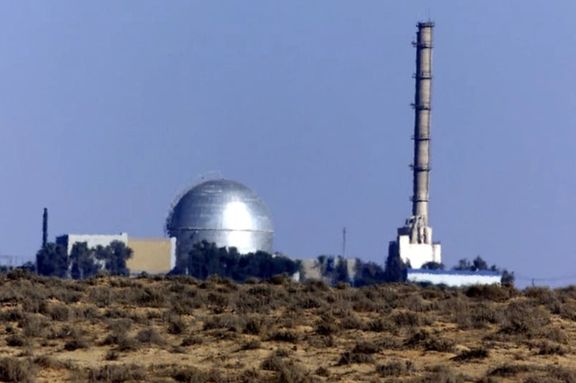
Israeli authorities say they have thwarted a new Iran-backed spy plot targeting Dimona nuclear facility as Iran continues to escalate its operations in the Jewish state.
“Following a joint investigation by the Israeli Defense Forces in Lahav 433 and the Shin Bet, a Beer Sheva resident was arrested on suspicion of initiating contact with intelligence elements in the Iranian regime and offering to sell information, among other things, claiming that he had access to the nuclear research complex,” the statement from Israel Police said.
Last month, Doron Buchovze, an Israeli citizen and resident of Beer Sheva, was arrested after being suspected of having committed security offenses for several months involving contact with Iranian agents and carrying out missions, including photographing installations and transmitting information for financial gain.

The investigation also revealed that Bukhobza initiated the contact, with the full understanding that he was in contact with an Iranian operator, and that it could cause harm to the state's security, the police said.
Israel Hayom reported that he had received 3,750 shekels ($1,000) in digital currency from an Iranian agent.
An indictment was filed against Buchovza on Sunday, charging him with the offenses of contacting a foreign agent and passing information to an enemy state.
It is the latest case as dozens have been foiled since the beginning of the Gaza war while Iran steps up its operations against its archenemy.
Asher Ben Artzi, the former head of Israeli Interpol and a research associate at The International Institute for Counter-Terrorism, told Iran International: “We are witnessing a further escalation in Iranian intelligence activity.
“This is no longer a weakened population with no connection to the state, this is a native Israeli who approached them on his own initiative and even carried out several missions for them. This is about treason against the State of Israel, the suspect who was arrested is a traitor. Treason in time of war. This is the most serious offense.”
Previous plots have targeted the country's military and political leaders, military facilities and nuclear research centers.